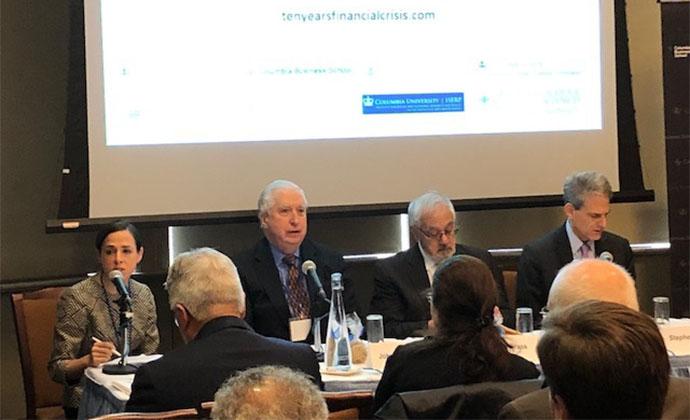Examining the Legacy of the Financial Crisis
A decade after the worst financial crisis since the Great Depression, a tolerance for risk-taking and the vulnerabilities that accompany it have returned, according to John C. Coffee Jr., the Adolf A. Berle Professor of Law and director of the Center on Corporate Governance at Columbia Law School.
Though the biggest banks are better capitalized and regulated than they were in the run-up to the crisis, money market mutual funds, which required the largest bailout by the government in 2008, remain undercapitalized and at risk of meeting obligations in a panic, Coffee contended on Nov. 8.
He was speaking at “Ten Years After the Financial Crisis,” a conference at Columbia that brought together leading experts on law, economics, and public policy, to examine the implications of the financial crisis.
He was joined by Kathryn Judge, a professor of law who serves on the Financial Research Advisory Committee of the Office of Financial Research; Katharina Pistor, the Michael I. Sovern Professor of Law and director of the Law School’s Center on Global Legal Transformation; Jeffrey Gordon, the Richard Paul Richman Professor of Law; and experts from across the university and around the world.
Speaking before a packed room, Coffee noted that the government is watering down rules that prevent banks from undertaking risky investments for their own accounts, loosening regulation for all but the largest banks, and reining in a panel of regulators created after the crisis. The latter has the power to subject to greater scrutiny financial institutions whose failure could precipitate a meltdown in the future.
Compensation plans for top executives that incentivize risk-taking and the prospect of volatility in financial markets fueled by speculation in bitcoin add to the uncertainty, he said.
“I’m not saying a crisis is imminent, but I am saying that the appetite for risk-taking has returned,” Coffee said, sitting on a panel that included Judge; Barney Frank, the former chairman of the House Financial Services Committee and lead sponsor of the 2010 Dodd-Frank law financial reforms; and Stephen M. Cutler, vice chairman of JPMorgan Chase and a lecturer at the Law School.
“The problem of systemic risk is still with us,” warned Coffee. “It comes from the blind side, but we have several blindsides.”
Still too complex
Judge highlighted the complexity that continues to characterize the financial system. Reforms enacted in the wake of the crisis strengthened but did not simplify the framework of financial regulation, she said.
To illustrate, Judge displayed a visualization of the law governing banking that mapped the law’s structure based on an analysis of data that ties to sections of the law cited in web searches. “Where we have complexity, we are prone to breakdowns in structure,” she added, noting that the banking law lags only the tax code in terms of complexity.
According to Judge, the growth of institutions such as hedge funds that invest in company debt, money market funds, and finance companies that are outside the oversight of regulators compounds risk, as does a proliferation of subsidiaries at the biggest financial institutions.
A tangle of subsidiaries can impede the ability of institutions to gauge their exposure to risk in a transaction, Judge noted, adding the one source of dysfunction that fueled the crisis “came from people not knowing whether their counterparties were healthy.”
The reality of Dodd-Frank
For his part, Frank pushed back on the premise that systemic risk has returned to the extent suggested by Coffee. In the wake of the crisis, resentment by the public toward government bailouts for banks means that presidents of either party face political pressure to prevent banks from failing in the first place, he observed.
Despite loosening of some rules, the law continues to prevent lenders from issuing and securitizing the types of risky mortgages that fueled the financial crisis.
“Bailout is still a bad word, but the worst mortgages are still illegal and can’t be made,” said Frank, who observed that both parties in Congress have for the most part accepted the post-crisis reforms.
The consensus means Congress can turn to rationalizing regulation with the aim of reducing complexity, Frank added.
Cutler, who previously served as head of enforcement at the Securities and Exchange Commission, pointed to the dangers of overregulation and wholesale deregulation. “Regulators have to step back and look at the whole of what they’re doing,” he said. Too much regulation, noted Cutler, can stifle growth and limit the availability of financial products and services; too little can lead to abuses.
Though failures of financial institutions may be a fact of life, reforms adopted in response to the crisis are working, Cutler added. “I think we have gotten ourselves to a place where if any big bank fails, it’s not going to be systemic,” he said. “We can see a big bank fail without bringing everyone down with it.”
Other participants in the two-day conference included former Treasury Secretary Jacob J. Lew; Joseph Stiglitz, university professor at Columbia and a Nobel Laureate in economics; William Winters, the CEO of Standard Chartered; and Glenn Hubbard, dean of Columbia Business School and a former chairman of the Council of Economic Advisers during the George W. Bush administration.
Related reading
Professor John C. Coffee Jr. Testifies Before House Financial Services Committee
Information Gaps and Shadow Banking
Professor Jeffrey Gordon to Treasury: Designation Authority Limits Risk of Financial Crisis
###
Posted on Dec. 13, 2017
